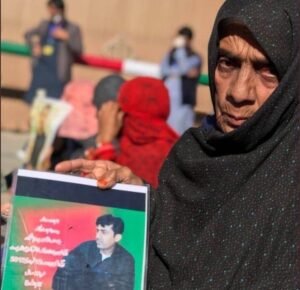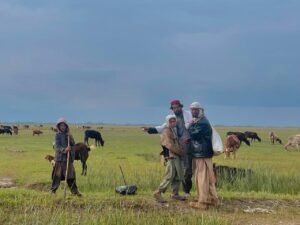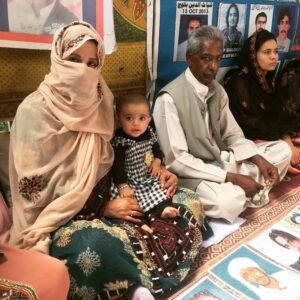Dialogue and Diplomacy with Pakistan: A Futile Endeavor Without Military Subordination

The Pakistani military has closed the main road from Dera Ismail Khan to Tank in the Hathala area. Photo: @PTM on X.
By A. Shafaq
The recent escalation between India and Pakistan, culminating in Operation Sindoor, underscores the persistent challenges in engaging Pakistan through diplomatic channels. India’s targeted strikes on May 7, 2025, aimed at dismantling terrorist infrastructure both deep inside Pakistan and also along the regions closer to Line of Control, were a direct response to the April 22 massacre of 26 Hindu tourists in Pahalgam, Jammu & Kashmir. Despite India’s assertions of precision targeting and restraint, Pakistan’s retaliation and subsequent ceasefire violations highlight the deep-seated issues that hinder meaningful dialogue.
Central to this impasse is the disproportionate influence wielded by Pakistan’s military over its civilian government. Historically, the military has maintained significant control over key areas such as foreign policy, security, and economic management. This dominance is further entrenched by the military’s expansive economic interests, with holdings valued at approximately $100 billion, encompassing sectors from agriculture to real estate. Such economic clout not only consolidates the military’s power but also undermines the autonomy of elected civilian leaders.
The military’s entanglement with extremist groups further complicates the prospect of diplomacy. UN sanctioned terror organizations such as Lashkar-e-Taiba (LeT) and Jaish-e-Mohammed (JeM) continue to operate with impunity within Pakistan. These groups have been implicated in numerous attacks against India, including the 2008 Mumbai attacks, which claimed 166 lives. Investigations have revealed connections between these groups and Pakistan’s Inter-Services Intelligence (ISI), with reports indicating that ISI officers were involved in the planning and execution of the Mumbai attacks. Despite international pressure, key figures like LeT founder Hafiz Saeed and JeM leader Masood Azhar remain at large, with Pakistan showing little inclination to prosecute them.
The military’s patronage of these groups is not merely passive. After the recent strikes by India on the terror infrastructure of LeT and JeM, funeral of the killed terrorists were held with State honous in Pakistan. The funeral had participation from senior Pakistan Army and Government officials. One of the funeral prayer was led by Hafiz Abdul Rauf, an UN proscribed terrorist and large number of Pakistani army and government officials were seen standing behind them. Theseactions not only legitimize these terror groups but also signal the military’s endorsement of their activities. This symbiotic relationship between the military and extremist organizations undermines any diplomatic overtures by civilian leaders, rendering them ineffective.
Moreover, Pakistan’s response to international concerns has been marked by obfuscation and denial. Following the Mumbai attacks, Pakistan initially dismissed evidence provided by India and international agencies, only later admitting that parts of the conspiracy were hatched on its soil. However, substantive action against the perpetrators remains elusive. Trials have been delayed, and key suspects have been released on bail or placed under nominal house arrest, only to resume their activities later. Against this backdrop, Pakistan’s recent demand for an independent investigation into the Pahalgam incident is not only unconvincing—it is deeply ironic.
In this context, India’s skepticism towards dialogue is understandable. Engaging in talks with a civilian government that lacks authority over critical security matters is unlikely to yield tangible results. The military’s overarching influence ensures that any agreements or understandings reached through diplomatic channels can be easily overridden or ignored. Furthermore, the military’s vested interests in perpetuating hostility with India, both for strategic leverage and domestic consolidation of power, make it an unreliable partner in peace initiatives.
For diplomacy to be effective, it is imperative that Pakistan undergoes structural reforms that relegate the military to its constitutionally mandated role. This includes establishing civilian supremacy over foreign and security policies, dismantling the military’s economic empire to reduce its undue influence, and taking decisive action against extremist groups operating within its borders. Only then can trust be rebuilt, and meaningful dialogue between India and Pakistan be pursued.
Until such changes are realized, India is right in dealing directly with the threat and creating a deterrence. India’s modified position that any act of terror would be considered as act of war is the right way to deal with Pakistan. This approach also aligns with the broader international shift in how states respond to non-state actors that enjoy state patronage. By holding the Pakistani state—and particularly its military—accountable for enabling cross-border terrorism, India is asserting its sovereign right to defend its citizens and territory. While dialogue and diplomacy remain the preferred instruments in international relations, they cannot function in a vacuum of trust or in the presence of persistent hostility. In case of Pakistan, where the military holds veto power over peace initiatives and shields extremist terror networks, a firm, security-first policy is not just reasonable—it is imperative.
A. Shafaq (pseudonym) is a researcher and lecturer at one of the private universities in Kabul.
Note: The contents of the article are of sole responsibility of the author. Afghan Diaspora Network will not be responsible for any inaccurate or incorrect statement in the articles.










